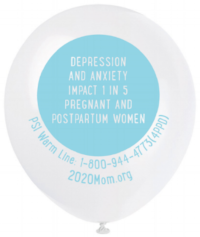In June 2020 Mom, in partnership with the March of Dimes, launched March for Moms®, a walk to raise awareness for maternal mental health and related disorders, including depression and anxiety. Marches were held throughout the country in support of mothers and their families. While the walk was open to all survivors, families, supporters and health care providers, very few fathers were present. My husband noticed this as he sat blowing up balloons with maternal health statistics printed on them (see below). As I looked around at the many women and their children, I did notice the absence of men. Where are all the dads?

Maternal mental illness impacts everyone. While there is considerable media attention devoted to maternal mental health issues and the impact that this has on the mother and child, there has been less focus on the experience of dads and partners. Maternal mental illness has a negative impact on fathers, including higher likelihood of personal mental illness. One of the risk factors for fathers developing depression is to have a partner who experiences a Perinatal Mood and Anxiety Disorder (PMADs).
The stigma of struggling in early parenthood is higher for men than it is for women. We see fathers as stoic and self-sacrificing or disconnected from their emotions. We tend to forget that men are impacted both as partners of someone suffering and as suffers of depression or anxiety themselves. Postpartum Support International (PSI) reports that 10% of new dads experience paternal postpartum depression, and are at an even greater risk when their partners are depressed.
According to medical professionals, men’s hormones, such as testosterone levels, can change during a partner’s pregnancy and after the birth of a new baby (Kelly, March 2017). Combine the decrease in male hormones with the change in role (dude-to-dad) and often a change in relationship with a partner (suddenly becoming a second-class citizen) and getting a little (lot) less sleep than they are used to, dads are vulnerable to depression and anxiety. When men experience symptoms of depression or anxiety as new parents they are often resistant to seeking help. Therefore, we must encourage fathers to find support of their own.
We expect new fathers to be involved in parenting, but many feel unprepared and are unaware of the signs and symptoms of depression. I teach a newborn class on the postpartum unit of a hospital. The class is usually filled with first-time fathers. After watching their partners go through the process and pains of labor and standing sidelines as new moms learn to nurse their newborns, attending the class is a welcomed activity that these new dads can participate in. Many fathers are tired and anxious, stressed over the new responsibilities of fatherhood. Admittedly, my focus has been on the mental health and well-being of the mother and baby. Leave it to my husband to provide a little perspective of the experience of the opposite gender.
In understanding that maternal mental illness impacts everyone in the family, especially dads, what do we need to do to make sure that these partners are not forgotten?
Tips to help support dads:
- Check-in with dad too. After a baby is born we tend to ask how the mother and baby are doing, but don’t forget about dad. Ask dad how he is coping with the new baby too.
- Provide the space for fathers to acknowledge their feelings about parenthood. A safe space can allow fathers to talk about their new responsibilities and fears. Just providing the space to talk can alleviate anxiety and stress.
- Allow fathers to take an active role in child caring. Sometimes a mother’s own anxieties about the baby can get in the way of the father taking an active part in child care. Who cares if the diaper is on wrong? Let dad figure this out! He wants to help, so let him.
- Know the signs and symptoms of depression and anxiety. Often we miss the signs of depression and anxiety in our loved ones and ourselves. Be aware of what is normal adjustment to parenthood and what might be more serious signs of mental illness.
- Encourage dad to get help when needed. Reduce the stigma associated with mental health and mental health treatment by normalizing and encouraging fathers to get support. Seek out counseling or support from other new fathers.
- Enhance the well-being and health of the entire family. Maternal mental illness impacts the entire family. When we treat mom in her recovery, we must also help the whole family to heal. Be mindful to treat everyone.
If you think your partner or loved one is suffering from depression, get help and contact Jamie Kreiter, LCSW here.
Written By jamie.kreiterLCSW
Maternal Mental Illness Impacts Everyone: The Struggle for Partners was originally published @ Blog – Jamie Kreiter, LCSW and has been syndicated with permission.
PHOTO BY © Dmytro Dudchenko | Dreamstime.com
Sources:
Our authors want to hear from you! Click to leave a comment
Related Posts



